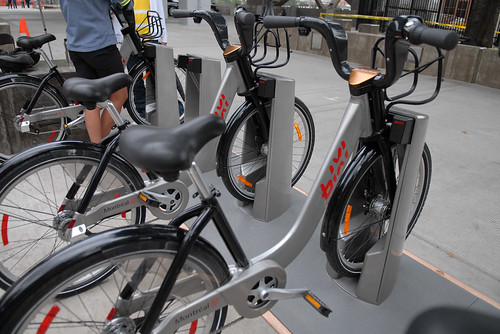
(Photo © J. Maus/BikePortland)
As promised, the City of Portland just released its official Request for Proposals (RFP) seeking an operator of the Portland Bike Share system. The 54 page document lays out all the details of the system envisioned by the City. Bids on the project are due on May 25th and the City is expected to choose a vendor shortly thereafter. The system itself, the RFP says, is should be fully operational by April 2013 with a possible test of the system by this fall.
Let’s look at some of the interesting bits in the RFP…
Here’s how PBOT introduces the system:
Portland envisions implementing the most popular and highly utilized bike sharing system in the United States; one that catalyzes investment in public spaces and provides a low cost transportation solution for thousands of system users. Bike sharing stations should serve as a basis for place-making in the city, and applications that directly couple bike share stations with other uniquely “Portland” public benefits such as distribution of bicycle maps, provision of local food or drinks, bicycle helmet sales, ATMs or other enterprises that enhance the public space around bike share stations are highly encouraged.
Under a list of specific goals for the new system, the City says they want it to provide an “immediate increase” in the number of bike trips and “bring new people to bicycling by reducing financial barriers to bicycling as transportation.” They also cite ways the system should strengthen the local economy by creating jobs, and leaving more money in user’s pockets by reducing transportation costs that they will then spend locally. Another goal listed is to provide a transportation choice that’s, “complementary to transit service for underserved populations.”
Under the terms laid out in the RFP, the successful bidder will come up with work with the City on rental station locations and must come up with a full-fledged marketing, branding, and promotional plan (including a social media strategy).
When it comes to payment systems, “with the intent of maximizing ridership and net revenue and low income patron access,” the winning bidder must show at least two pricing models and the pricing system must be integrated into existing transit and parking system.
The RFP calls for a proposals that will cover five years of system operation and stipulates that the chosen vendor must adhere to all federal reporting standards as it spends the $1.8 million set aside for the project.
Since the federal funds can only be used to buy the bikes, station equipment, and other hard infrastructure, the vendor must figure out a way to fund the ongoing operational costs. Due to what they referred to as “legal and social constraints” the proposals cannot include any paid advertising in the public right of way. However, given that a private sponsor is expected to come on board, their logo and messaging could be placed on the bicycles, kiosks, receipts, and on the official system web site.
Among the information the bidders must provide is a requirement to, “Describe your plan to provide helmets for bike sharing users” and “Describe how the proposal could take advantage or specifically increase the capacity and employment of Portland’s bicycle building industry.”
Bike share is coming folks. It will be interesting to see who applies and of course, who ends up winning the contract.
One last note, since the PDX Bike Share website was launched on Monday, PBOT reports that over 1,100 station locations have been submitted.





Does it say how many bikes and stations there will be? Successful systems have densely packed stations, every few blocks apart, in the central city.
I looked for that too Joseph but didn’t notice any numbers mentioned. I assume that’s because they feel the actual number of stations is something that should come from the vendors. But past statements have said PBOT want around 75 stations and 750 bikes, which would make it much smaller than NYC’s system or Chicago’s system (hence the lower cost too).
Thanks. 75 stations is enough to properly cover the downtown core and the LLoyd District, but nothing else. If they try to spread out to other parts of town, the stations would be scattered too sparsely. The standard is about 25 stations per square mile, so 75 bikes gets us 3 square miles: http://www.theatlanticcities.com/commute/2011/10/how-new-york-city-will-choose-its-bike-share-stations/248/
Google map of potential area: http://g.co/maps/a3enn
They’re moving quickly. I like that. I wonder how the City will weigh the answers to the helmet provisioning question when they score the bids. Frankly, it’s a good question to ask because it puts pressure on the vendors to think about it, but I don’t want to see it become a critical element.
Jonathan: Do you know if there will be another public display of the competing systems, like there was last year? That event was thrown together a little hastily and some vendors didn’t participate. It would be nice to see more of the possibilities.
On the “station suggestion map” I noticed that there were some suggestions for stations in Vancouver. I figured that if we’re going to submit whimsical suggestions like those (this is a City of Portland project, after all), I should put one at the summit of Mt Hood. It’s equally likely.
Maybe the payment system can be a fast, prepaid, contactless system that pays TriMet fares, too.
Wishful thinking, I know.
DOH! Why didn’t I think of that?
Nothing sells a product like the convenience factor. And any savvy project pusher seeing an opportunity like this will give it due consideration – really. This is exactly the kind of convenience factor that gets projects like this pushed through.
Interesting that they asked for a description of how the plan should provide helmets. Is there a successful plan that does? I think that an emphasis on helmets will hinder progress, rather than support it.
One would wonder if preferential treatment would be given to those who provide plans for providing helmets.
Considering the record of safety PSB systems throughout the world that do not use helmets, and the record of use of PSB systems that provide or require helmets, one has to wonder why the provision of helmets seems to be a factor.
The Melbourne, and Brisbane systems have been failures and Sydney has recently announced it will accept a PSB system only if it includes an exemption from helmet use
http://www.smh.com.au/nsw/bike-hire-plans-hinge-on-helmets-20120304-1ub4f.html
Vancouver, BC will implement a PSB system that includes an option that will provide helmets for users soon. Will the system be used as much, or less than others systems that do not provide helmets?
Does the definition of success of a PSB system hinge on bicycle, or helmet usage?
I think this is great news, the city will need powerful tools like bike share to reach the goals in the Portland Plan. The helmet issue is a tough one, but it will be interesting to see the possible solutions.
Is it too expensive to ride a bike that we need a bike sharing system? Am I missing something here. Who is the target population? Is it cost effective? Just because it involves bicycles doesn’t mean it should automatically get the green light. Good luck with it ever becoming sustainable!!!
I’m with you Mike. I want this to be successful. Honest. But I just don’t see it happening. I’m still fuzzy on the target market for this. Even with Brad K saying what he does, I just don’t see this working. I hope I’m wrong. But my fear is this fails, hard, and it’s held against future bikey things by those who hate bikes. But hey, I hope I’m proven wrong!
What you are missing is the target market for bike share are those people who do not normally ride for transportation; in other words, the vast majority of people.
Bike shares have increased ridership to dramatic degrees by providing a convent solution for short term needs. It is not uncommon to see the number of cyclists double and triple in cities that provide it.
More cyclists, more safety for cyclists, and more consideration for cycling concerns and issues.
I am still lost on who will actually grab one of these bikes. Picture the month of November, the rain is pelting down, and there is a rack of shiney new bikes for rent. Is that an attractive situation for “new riders”? I doubt it. Fast forward to the sunny months of summer. If you were pondering your first bike ride would this be your first choice? Come on, it is nothing more that a feather in the cap of the city council. I can’t wait to see what the clientel is that frequents this share program. It caters to the waterfront homeless if no one else.
Think what you will, but look at the facts. Bicycle share systems have increased the amount of trips by bicycles everywhere they have been implemented throughout the world. Even the couple of systems that have proven to be exceptions to this rule and have been considered failures have increased trips by bicycles. Setting up a public bike share system wouldn’t be considered unless it would benefit the city that invested in it.